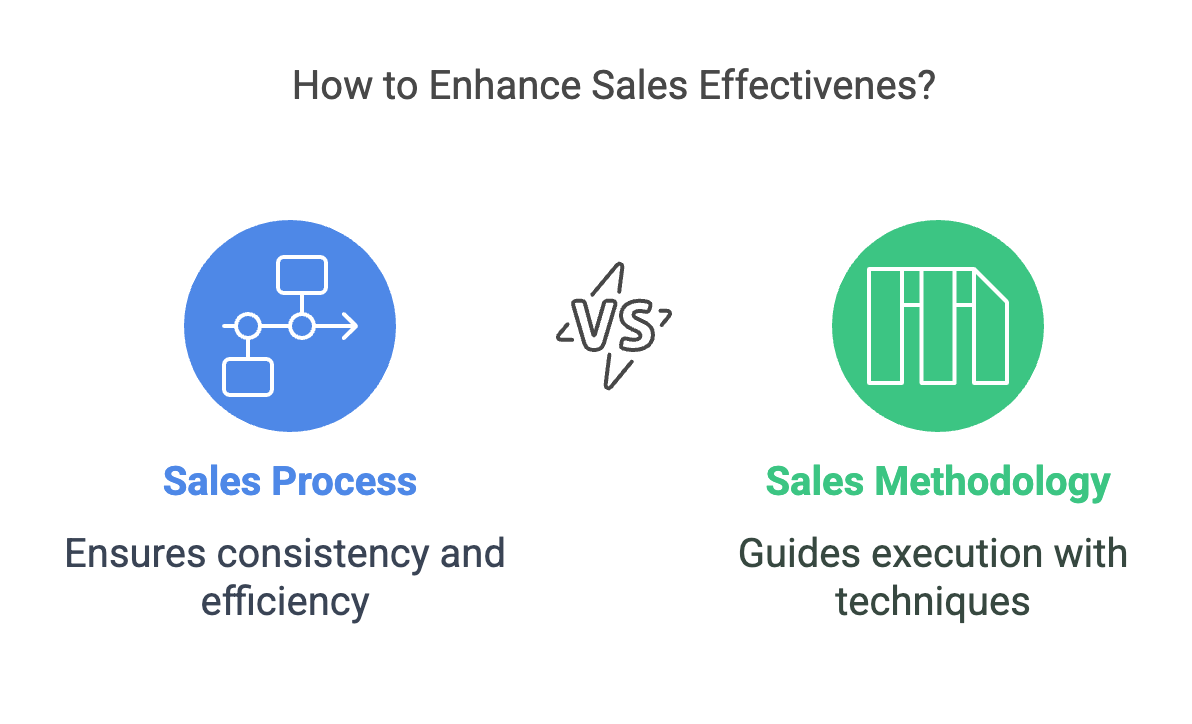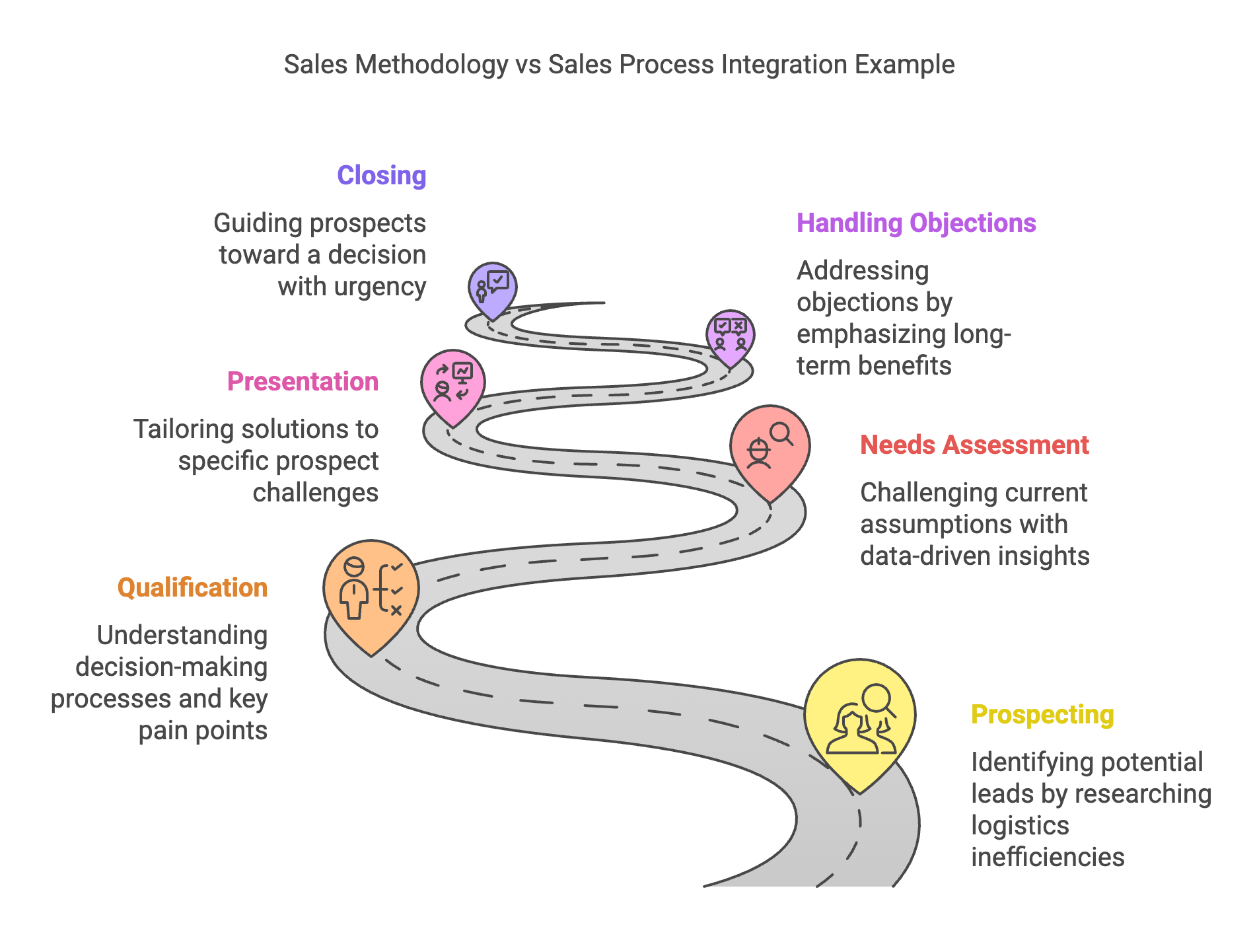- Home
- Sales Skills
- Sales Methodology
- Sales Methodology vs Sales Process
Sales Methodology vs Sales Process
Sales methodology vs sales process highlights two key ingredients in successful sales management. While they’re closely related, they play different roles.
Think of the sales process as the "what"—the steps your team takes to move from prospect to customer—and the sales methodology as the "how"—the strategies and techniques they use to make those steps effective.
Below is an example of a sales methodology vs sales process.

What Is A Sales Process?
A sales process is a structured series of steps your team follows to close deals. It’s like a roadmap that ensures every salesperson knows exactly what to do at each sales cycle stage.
Purpose:
The sales process keeps things consistent and efficient, ensuring your team stays on track and prospects move smoothly toward becoming customers.
What Is A Sales Methodology?
A sales methodology provides the strategies, techniques, and mindset that sales reps use to execute the sales process. It’s all about how your team interacts with customers, adapts to their needs, and achieves sales goals.
Purpose:
While the sales process outlines the steps, the methodology ensures that those steps are executed effectively, shaping how sales reps engage with prospects.
Sales Methodology vs Sales Process Example
Let’s look at how InnovateTech blends the Challenger Sale methodology with its structured sales process to create a winning approach.
By connecting each of the steps in the sales process with the methodology’s principles, their team ensures every customer interaction is insightful, tailored, and confidently managed.

Prospecting
Challenger Methodology Application:
Sales reps identify potential leads by researching companies experiencing inefficiencies in logistics. They focus on prospects likely to benefit from industry insights, such as businesses with high shipping costs or supply chain delays.
- Example: A rep discovers that ABC Logistics has increased freight costs by 15% over the past year and adds them to the pipeline.
Qualification
Challenger Methodology Application:
Reps qualify leads by understanding their decision-making process and key pain points. During this stage, they start to educate prospects by sharing high-level insights.
- Example: The rep asks, “Are rising freight costs impacting your delivery timelines?” and introduces a study showing how logistics inefficiencies lead to profit erosion.
Needs Assessment
Challenger Methodology Application (Teach)
Reps dive deeper by challenging prospects' current assumptions about their logistics systems. They provide data-driven insights that highlight inefficiencies the prospect may not have fully recognized.
- Example: The rep explains, “Our research shows that companies using outdated logistics systems spend 20% more annually on freight than those with automated solutions. Here’s how your peers have addressed this issue.”
Presentation
Challenger Methodology Application (Tailor)
Reps tailor their message to the prospect’s specific pain points and goals, customizing the solution to their unique challenges.
- Example: Based on ABC Logistics’ challenges, the rep presents a solution emphasizing reduced freight costs and improved on-time delivery rates, aligning directly with their concerns.
Handling Objections
Challenger Methodology Application (Take Control):
Reps assertively address objections by reframing the conversation to focus on the long-term benefits and risks of inaction.
- Example: When the prospect says, “This solution is expensive,” the rep responds, “I understand, but let’s consider the cost of continuing with your current system. How much are delays and customer dissatisfaction costing you annually?”
Closing
Challenger Methodology Application (Take Control)
Reps guide the prospect confidently toward a decision, emphasizing the urgency and value of acting now.
- Example: The rep says, “By implementing this solution within the next quarter, you could start seeing cost savings immediately and meet your end-of-year delivery goals. Let’s outline the next steps to move forward.”
Follow-Up
Challenger Methodology Application (Teach and Tailor)
Reps maintain the relationship by providing ongoing insights and tailored support, ensuring the solution delivers value over time.
- Example: The rep shares quarterly updates on how the solution has reduced freight costs by 18% and offers suggestions for optimizing other logistics processes.
Key Takeaways
The sales process provides a structured pathway from prospecting to follow-up, ensuring consistency across sales activities.
The Challenger methodology enhances each stage by teaching new insights, tailoring messages to customer needs, and taking control of conversations.
Together, the sales process and methodology ensure that InnovateTech’s sales reps effectively engage prospects, confidently overcome objections, and deliver lasting value to customers.
This alignment between the process and methodology creates a seamless, impactful sales approach that drives customer satisfaction and revenue growth.
Conclusion -
Sales Methodology vs Sales Process
In summary, the sales process is a structured framework—a clear, step-by-step roadmap that ensures consistency and efficiency in managing sales opportunities. On the other hand, a sales methodology is the strategic playbook, guiding how each step is executed by equipping salespeople with the proper techniques, philosophies, and behaviors to connect with customers effectively.
Combined, these two elements create a powerful system that drives operational consistency and customer engagement. A well-defined sales process ensures that no opportunity falls through the cracks. In contrast, a thoughtfully chosen methodology, like Challenger, SPIN, or Consultative Selling, ensures those opportunities are approached in the most impactful way.
Together, they help teams close deals, build lasting customer relationships, and foster long-term business growth.
By aligning your process with the right methodology—or even blending elements of several—you can create a sales strategy tailored to your business and set your team up for sustainable success.